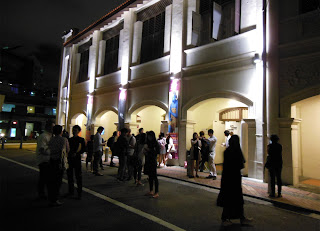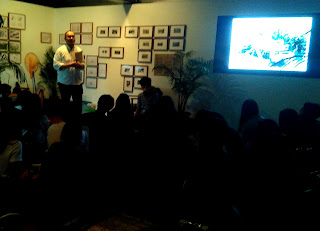9 September 2017
“Trojan Women”---Singapore International Festival of Arts (SIFA)
Country: Singapore, South Korea
Produced by: National Changgeuk Company of Korea, National Theater of Korea and SIFA
Directed by: Ong Keng Sen
Written for Changgeuk by: Bae Sam Sik
Pansori Composed by: Ahn Sook Sun
Composed by: Wen Hui
Cast: Kim Kum-mi, Yi So-yeon, Kim Ji-sook
Location I watched: Victoria Theatre
For SIFA Founding Festival Director, Ong Keng Sen, 2017 was his final year. “Trojan Women”, his new work based on Euripides’ play, was co-produced with the National Changgeuk Company of Korea belonging to the National Theater of Korea. This company performs changgeuk, traditional Korean opera in the Korean folk song style called pansori.
“Trojan Women” is a simple story. It is set in the Kingdom of Troy just after 10 years’ Trojan War ended with Greece’s victory. Trojan women from the royal family were captured and now, they are waiting to be taken to Greece as slaves. The women realize their fate and grieve deeply.
“Trojan Women” opens with Soul of Souls singing the prologue with an orchestra. After that, the queen of Troy, Hecuba, and the other Trojan women sing their lines like they are shouting almost for the next 2 hours. The performers have put on microphones, but I did not think that they needed it. Their voice was very loud. As already mentioned, the story is just that horrible fate is awaiting them. There is no solution or surprise at the end. The women erupt with their anger, grudge and grief.
The white stage set is simple. In the centre of the stage, there is a square arcade shaped like an entrance of a tent for captives. The roof of the arcade is connected to a platform with two staircases on either side of the stage. The back of the stage is cut into a semicircle shape. Various images---fire, stars and clouds---are sometimes projected in that arcade and the semicircle part. Trojan women wear white while Helen and the Greek solders wear gray. “Trojan Women” focuses on each woman one by one---Hecuba’s lament, Cassandra, her daughter’s grudge and madness, Andromache, the wife of Hecuba’s son’s grief and sorrow, and then the queen of Sparta who was the main cause of the Trojan War, Helen... In one scene, Andromache’s baby son was taken by the Greeks. When he was returned to his mother, the cloth that wrapped him turned from blue to red. Even this tragic incident is not the climax of this story. The play climaxes when Hecuba’s fury and grief explode. She says that even if they die, their brave figures will be talked about long into the future. She climbs up to the roof of the arcade and stands firm. Then she declares that she will never leave Troy. Finally Soul of Souls appears again and sings for the end of the play.
 |
| Before the show starts |
For me, Ong Keng Sen’s work from last year, “Sandaime Richard” was not a successful one. “Sandaime Richard” is based on a Japanese theatre director/play writer, Noda Hideki’s play. “Sandaime Richard” was written for Noda’s former company, “Yume no Yumin-sha” in 1990. In this play, Shakespeare meets Shylock and the world of “Richard Ⅲ” is replaced by a family feud in a school for Japanese flower arrangement. While the narrative is deconstructed using vast wordplay, actors “play” using up their bodies. Chaos on the stage suddenly drives the audience to a moving catastrophe. That is the unique feature of Noda’s play, I think. Ong Keng Sen’s concepts were ambitious --- mixing Southeast Asian culture with Japanese culture, making the characters’ gender vague and showing traditional arts with contemporary style. However, perhaps one of the most important things to make that play fascinating was where Ong Keng Sen as a theatre director is not his strongest. There is not enough “play” on Ong’s stage. This “play” does not mean performing arts and literary means “playing”. Maybe it is better to describe as being a “fool”. Ong’s “Sandaime Richard” was beautifully unified and the intellectual theme was clear. However, its beauty or intellect did not have enough enthusiasm to move the audience. Performing arts are done by the human body, and the audience directly experiences that. The human body is not always beautiful. Enthusiasm given by the human body is not so logical. On stage, vulgar passion or nonsensical energy is often important to give enjoyment to the audience, I think.
On the contrary, this year’s “Trojan Women” is Ong’s more successful work. Trojan women’s grudge or grief becomes passionate and powerful by Korean pansori. This simple concept worked well. The rough and strong impression of the performance prevented the stage from falling into unexciting beauty.
However, one scene was unacceptable for me. That was Helen’s scene. After the Trojan women brought out their grief, Helen appears on stage. Suddenly a grand piano with an accompanist appears as well. She starts singing along with the piano accompaniment. She is the root cause of the Trojan War. Nevertheless, Helen is singing for forgiveness to Menelaus, her former husband. Menelaus is moved by her song, entreaty and eventually forgives her. She never meets the tragic fate of the Trojan women. That unfair and injustice makes Hecuba furious. Helen is wearing grey, the colour used by the Greeks. More importantly, a male actor is playing this role. The male actor is disguised as “the most beautiful woman all over the world” and sings with the piano accompaniment. He is not just wearing a grey costume, but his song also does not sound like pansori, used by the Trojan women. This completely different and sudden scene should have created modulation on the stage because the Trojan women’s passionate grief by pansori constantly keeps high tension and it makes the audience tired. However, I do not think that this modulation worked well. It should have become a partly comical scene, but it is likely to have caused a snigger. Maybe the reason is that until reaching this moment, the serious scenes were too long and there was no space for a playful tone. This sudden comical or sarcastic scene feels like a not funny joke and it is lacking in balance. Besides I do not like the idea that the only one woman who never share the sorrows with the Trojan women is played by a male actor. Grey and white, Greece and Troy, men and women and a “traitor” among the women acted by a man...the contrast is beautiful as formation. However it is unexciting on stage because we see the concept too clearly.
The general impression of this “Trojan Women” is that everyone is constantly shouting for grief or grudge. It is like listening to sirens that never stops. This makes the audience a little bit exhausted. However, this unrefined passion and tension eventually makes that climax powerful. When Hecuba climbs up to the roof and declares that she will not leave Troy there, she raises the audience’s spirit, as well. In the tragedy of war, the Trojan women cannot do anything. They are violated and there is only despair and ruin in front of them. However, even though they know there will be no happiness in their future, they strongly show how they are surviving through this terror. Among the sorrow of women, war casualties, on the contrary, women’ vitality wells up.
However, the most moving moment is when the characters just speak in ordinary and calm tomes---no shouting and no singing. There are only a few scenes in this play, so they feel more impressive. For example, Cassandra --- she has the power to predict the future --- told Hecuba, “Mother, your suffering will end soon because you can live only for a few days.” Or, one of the Greek soldiers offered the Trojan women for Andromache’s killed baby, the heir to Troy, “I will help to bury him.” On the one hand, the intense passion from anger and sorrow show the audience the last glow of the Trojan women’s life. On the other hand, the words in natural and ordinary tones touches us with humanity to sympathize with others. And “The 10 years’ war ended, and the next 10 years’ war will begin.” When Hecuba quietly says, that sounds as if she talks about our era, our anxiety and tension in the contemporary world. There is no requiem. There is just a shout and fury. (3 January 2018)
 |
| Curtain call by the cast |
 |
| Victoria Theatre |






















